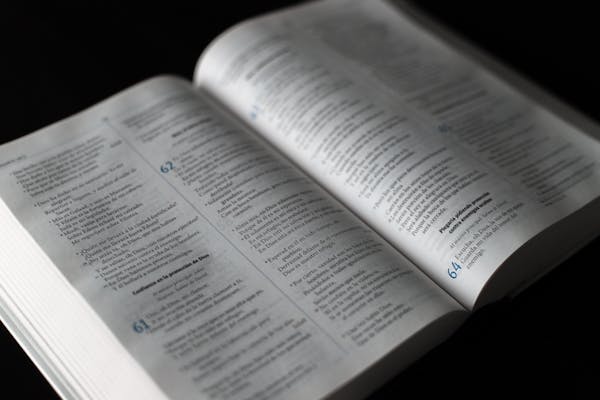Rare Christian books captivate with their historical significance and the wisdom they contain. Exploring the world of used Christian literature unveils a treasure trove, each volume holding stories and insights that span generations. Delving into the allure of these books with these rare christian book guide requires an appreciation for their value and the thrill of discovering hidden literary gems.
The Rare Christian Book Guide of 2024:
Understanding Rarity in Christian Literature
Defining Rareness in Books
Defining rarity in Christian literature goes beyond scarcity. It encompasses various factors such as age, historical significance, limited print runs, and the author’s influence. The rarity of a book is a fusion of these elements, shaping its desirability and value in the market.
Factors Contributing to Rarity in Christian Literature
- Age and Historical Significance: Older books often carry historical weight, contributing to their rarity. Historical significance can elevate a book’s value, especially if it pertains to a significant event or era.
- Limited Editions and Print Runs: Books with limited editions or small print runs become rare due to their scarcity.
- Author’s Significance and Influence: The impact and influence of the author on Christian literature play a crucial role in determining a book’s rarity. Influential authors or those tied to pivotal movements become highly sought after.
Throughout the evolution of Christianity since the time of Jesus Christ, writers have played a significant role. They began documenting religious teachings even before the advent of paper, utilizing materials such as stone, papyrus, and scrolls. Christianity itself advocates for education and has produced one of the world’s most revered literary works, the Bible. Alongside it, numerous other books on Christianity, focusing on the life and teachings of Jesus, have emerged, offering a wealth of content in this realm.
According to a 2011 Pew Research Center survey, the global Christian population reached 2.2 billion in 2010, a substantial increase from around 600 million in 1910. Projections suggest that by 2050, this figure will surpass 3 billion, maintaining Christianity’s status as the world’s largest religion, as indicated by a 2012 Pew Research Center survey.
In contemporary times, Christianity remains the predominant faith worldwide. Consequently, it’s undeniable that a multitude of Christian writers have contributed to the dissemination of Christ’s teachings. While delving into the vast array of Christian literature exceeds the scope of this article, a brief compilation of the top ten influential Christian authors who have significantly impacted the faith is provided.
John Bunyan
John Bunyan, a writer from the 17th century, penned his works with sincere passion, drawing inspiration from his own experiences and observations. Despite not aiming for commercial success, Bunyan’s selfless approach resulted in the remarkable success of his allegorical masterpiece, “Pilgrim’s Progress,” making it the second bestselling book of all time after the Bible. Despite enduring imprisonment, Bunyan found spiritual freedom and went on to write several other influential works, including “The Holy War,” “The Life and Death of Mr. Badman,” and “Grace Abounding to the Chief of Sinners.”
C. S. Lewis
Renowned as one of the most celebrated Christian authors, C. S. Lewis is best known for his enchanting tales, particularly the “Chronicles of Narnia” series. Lewis, a multifaceted individual, excelled as an academic, radio personality, scholar, poet, and novelist. His struggle with faith resonates with modern readers, contributing to his widespread appeal among Christians and non-Christians alike. Notable contributions include “Mere Christianity,” “The Allegory of Love,” and “The Screwtape Letters.”

Oswald Chambers
A Scottish evangelist, Oswald Chambers is revered for founding the Holiness movement and his profound teachings on the character of God. His spiritual and religious books have garnered immense popularity among devout believers, with translations in over 40 languages. Chambers’ enduring works include “My Utmost for His Highest,” “If You Will Ask,” and “Love, a Holy Command.”
G. K. Chesterton
G. K. Chesterton, an English writer, philosopher, and Christian apologist, humbly regarded himself as a journalist despite his literary acclaim. His thought-provoking books, including “Orthodoxy,” “The Man Who Was Thursday,” and “The Everlasting Man,” continue to inspire readers with their profound insights.
A. W. Tozer
An American pastor known for his intense prayer life and devotion, A. W. Tozer’s influential book “The Pursuit of God” remains highly esteemed within the Christian community. Tozer authored over 40 books, reflecting his unwavering commitment to following Christ and inspiring others to do the same.
St. Augustine
St. Augustine, the revered bishop of Hippo, left an indelible mark on Christian literature with timeless works like “Confessions” and “City of God.” His narratives of salvation and sin continue to resonate, imparting valuable lessons of faith and belief.
Jonathan Edwards
Renowned for his profound and poetic writing style, Jonathan Edwards captivated readers with works like the sermon “Sinners in the Hands of an Angry God.” His enduring collection of writings remains influential in religious circles.
John Foxe
John Foxe, a witness to tumultuous times for Christianity, chronicled the struggles faced by believers during periods of persecution. His notable works, including “Book of Martyrs” and “Acts and Monuments,” provide invaluable insights into the challenges of faith.
John Calvin
Inspired by Martin Luther, John Calvin played a pivotal role in the Reformation movement. His extensive knowledge of theology and history informed influential works such as “Institutes of the Christian Religion” and numerous commentaries on biblical books.
John Piper
Despite focusing predominantly on ancient figures, John Piper’s impact on contemporary believers must be considered. His works, including “Desiring God” and “Don’t Waste Your Life,” continue to inspire and challenge readers to live out their faith with purpose and passion.
Where to Seek Rare Christian Books
Thrift Stores and Secondhand Bookshops
Thrift stores and secondhand bookshops are treasure troves for finding hidden literary treasures. These locations often harbor overlooked gems at affordable prices.
Online Marketplaces and Auction Sites
Platforms like eBay and specialized auction sites provide access to a broader range of rare books. Navigating these online spaces requires a discerning eye to sift through listings and identify authentic rare finds.
Estate Sales and Garage Sales
Estate and garage sales occasionally unveil hidden collections. These settings can surprise with unexpected discoveries, offering rare books at considerable bargains.
Deciphering Book Conditions
Grading Systems for Used Books
Understanding book conditions relies on grading systems, assessing factors like wear, damage, and preservation. These grading criteria serve as a universal language for book conditions.
Factors Affecting Book Condition
Factors such as moisture, sunlight exposure, handling, and storage significantly impact a book’s condition. These elements influence a book’s longevity and desirability.
Research Techniques for Identifying Rare Christian Books
Utilizing Online Databases and Catalogs
Online databases and catalogs dedicated to rare books serve as valuable resources. They allow collectors to cross-reference and validate the authenticity of specific volumes.
Building Networks and Connections in Book Communities
Establishing connections within book communities, libraries, and archives opens doors to insider information and potential leads for rare Christian books.
Understanding Book Editions and Printings
Differentiating between editions and printings is crucial. Knowing the significance of various editions and printings aids in recognizing a book’s rarity.
An edition represents a distinct version of a book, differing from other editions in various aspects. Typically, a book labeled as a “revised edition” denotes the initial revision, though it might also be termed a “second edition.” Subsequent revisions are often numbered, such as third edition, fourth edition, and so forth. Additionally, a print book may be released electronically in formats like PDF, HTML, or Kindle editions. Occasionally, revisions are made to a book without significant changes, leading to designations like “Second Edition, Revised.” The edition of a book is commonly indicated on its title page, providing clarity to readers about its iteration and any modifications made.
Unveiling the Art of Negotiation
Haggling and Bargaining Etiquette
Navigating negotiations involves building rapport with sellers and understanding when to negotiate. It’s an art that demands finesse and understanding the fair market value of a book.
Knowing When to Walk Away
Knowing when to walk away from a deal is as crucial as initiating negotiations. This discernment prevents overpaying for a book that might not match its market value or condition.
Preserving and Restoring Rare Finds
Understanding Preservation Techniques
Preservation techniques encompass proper storage, handling, and environmental control to ensure a book’s longevity.
Book Restoration Professionals
Professional restoration services are essential for damaged or deteriorating books. Restoration experts utilize specialized techniques to revive and preserve the original quality of a rare book.
DIY Restoration Tips
Basic do-it-yourself restoration tips, such as cleaning, repairing minor damages, and proper storage, enable collectors to maintain the condition of their books.

Tips for Building a Rare Christian Book Collection
Focusing on Specific Authors or Themes
Focusing on specific authors, themes, or eras helps in curating a more coherent and meaningful collection.
Balancing Passion and Financial Constraints
Balancing the passion for collecting with financial limitations requires strategic planning and budgeting. It ensures a sustainable and satisfying collection.
Authenticity and Identifying Forgeries
Recognizing Common Forgery Techniques
Recognizing common forgery techniques, such as forged signatures or manipulated edition markings, is crucial in discerning authentic rare books from forgeries.
Seeking Professional Authentication
In cases of uncertainty, seeking professional authentication is pivotal. Expert opinion and analysis assure the authenticity of a rare find.
Showcasing Your Collection
Displaying and Sharing Your Treasures
Displaying rare books in physical or digital settings, such as social media or online communities, allows enthusiasts to share their passion and connect with like-minded individuals.
Conclusion:
Rare Christian books stand as testament to the enduring wisdom and history encapsulated within their pages. This guide seeks not just to aid in acquiring these literary treasures but to inspire a continual quest for exploration and discovery. The pursuit of these rare books is an ongoing narrative, an ever-evolving journey that beckons enthusiasts to delve deeper, uncover new treasures, and share in the collective appreciation for these remarkable literary gems.




